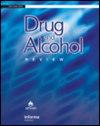Psychoactive substance use among Russian migrants relocated in Georgia following the 2022 invasion of Ukraine: Qualitative study
Abstract
Introduction
Study aimed at exploring the experience of migrants from Russia who use psychoactive substances, who arrived in Georgia in the wake of the invasion of Ukraine.
Methods
Qualitative individual interviews and focus group discussions. The data collection took place from May to August 2023.
Results
The final sample consisted of 23 respondents, who were mostly young and employed. Participants left Russia because of the war in Ukraine and the threat of conscription in Russia, but also due to political dissent. Participants experienced depressive symptoms and a worsening of mental health conditions. The increased consumption of sedatives and alcohol was closely associated with the efforts to manage stress and depression, acting as a means to cope with adverse effects on mental health. The absence of leisure alternatives emerged as a significant factor, with drug use becoming a feature of socialising in circumstances where such behaviour was not typical in their Russian lives. Participants exhibited low awareness of available relevant health services (including drug-related) and typically addressed recurrent health needs by consulting Russian specialists online or Russian-speaking professionals within Georgia's migrant community.
Discussion and Conclusions
Migration was associated with a deterioration in mental health status and substance use often manifested as a maladaptive strategy to cope with mental health problems. The difficulties encountered in the process of assimilation contributed to behaviours related to drug consumption. Immigration policies need to be inclusive of the health needs of migrants and provide opportunity to integrate effectively into society.

 求助内容:
求助内容: 应助结果提醒方式:
应助结果提醒方式:


